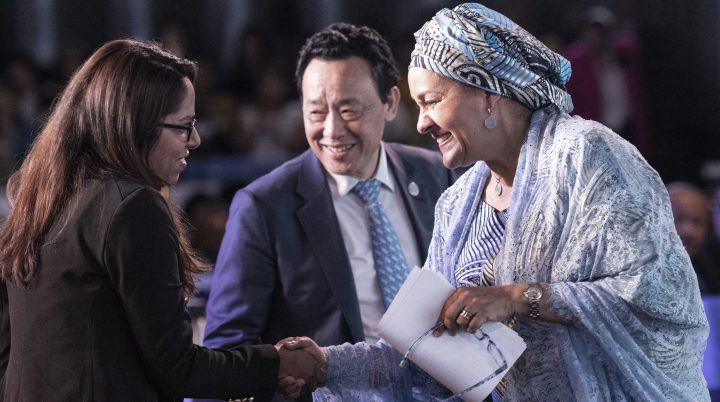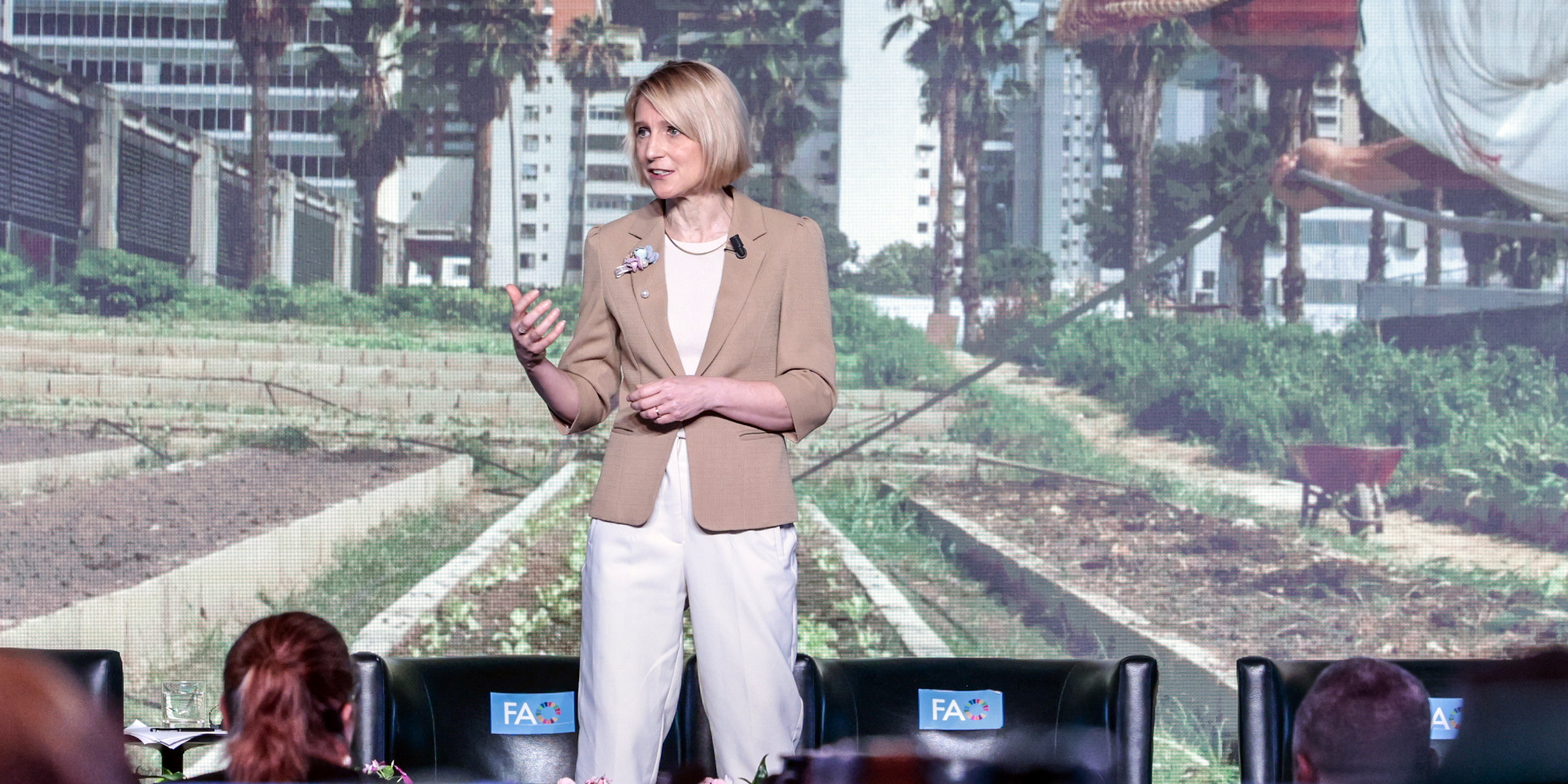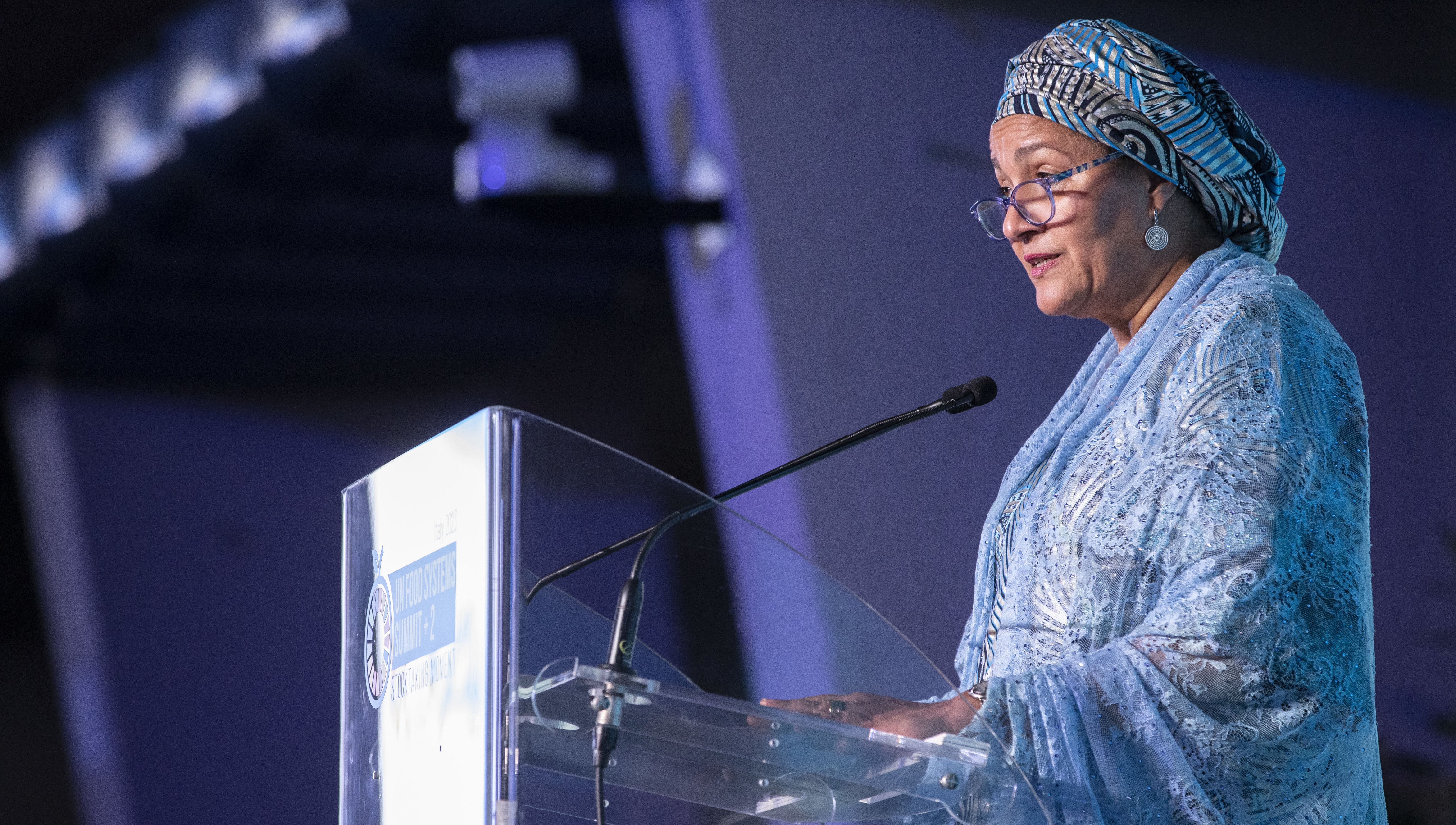
TUESDAY EDITORIAL
Our food systems are broken – now is the time for deeper change, UN summit hears

While how to achieve food systems transformation may not yet be clear to many countries, the fact that it needs to happen is – and the summit did succeed in setting several new mechanisms in motion.
Rome, Italy – As United Nations secretary-general António Guterres declared on 28 July that “the era of global boiling has arrived”, with July set to be the hottest month since temperature records began, the UN’s second Food Systems Summit (UNFSS+2) came to a close in Rome. Three days of intense meetings, panel discussions and dialogues involving 2,000 participants from 180 countries at the headquarters of the UN Food and Agriculture Organization (FAO) concluded with FAO director-general Qu Dongyu calling on all countries to accelerate their work on transforming food systems, which play a huge role in causing – and potentially alleviating – climate change, biodiversity loss, pollution, freshly alarming levels of global hunger and malnutrition.
The fact that “food systems are broken” was no secret at this meeting (these were Guterres’s words when he opened the summit), and discussions flowed frankly and freely about the reversal in global progress on alleviating hunger, the challenges and opportunities in implementing the sorely needed changes to global and national food systems, and the huge damage wrought to human health and to Earth’s environment by food systems that function primarily for profit, not for people.
Food systems contribute about 12% to global GDP, 30% to greenhouse gas emissions (especially due to the raising of livestock – beef above all – to satisfy humanity’s growing demand for meat), and 60% to biodiversity loss as once-wild lands are turned into pasture or cropland. One-third of the world’s food is produced by smallholder farmers, yet many of them can’t make a living, and face enormous barriers to markets, including lack of infrastructure, lack of access to innovative technologies, and trade restrictions. One-third of all food grown and produced is lost at some point after harvest or wasted at a household level by being thrown away – yet three billion of the planet’s eight billion humans are malnourished.
‘Something deeper must change’
Clearly, the way the world is producing and consuming food is massively problematic. An editorial in the journal Nature on the eve of the summit, acknowledging that climate change, crises and conflicts “have not been on our side lately”, said: “The fact that many countries are moving backwards in achieving food security and sustainable, equitable and resilient food systems is a clear sign that something deeper must change in the way we’ve been tackling these issues.”
Dr Corinna Hawkes, director of food systems and food security at the FAO, agreed, saying in an interview with Maverick Citizen one day before the summit began: “It’s because of things not working that we have to ask: What are we asking the world to do differently? What are the disruptions needed to do things differently?”
Our current national and global food systems are still not able to make enough healthy food available, affordable and accessible to everyone.
Transformation of the agri-food system is essential, Hawkes said. But, said Dr Lawrence Haddad, executive director of GAIN (Global Alliance on Improved Nutrition) and the 2018 World Food Prize Laureate, this remains a stumbling block. Leading up to the summit, Haddad observed that many ministers of agriculture he spoke to “still do not appreciate the difference between agricultural transformation and food system transformation”.
While agricultural transformation focuses on “improved food security and income generation to enhance rural livelihoods and promote growth”, Haddad and GAIN senior adviser Jamie Morrison explained in an article for AllAfrica, food system transformation goes above and beyond this, with a more systemic approach that connects “activities and decisions from farm to plate to ensure that farming practices (including the choice of crops) are not driven solely by income generation”, and includes other goals such as healthier diets to reduce malnutrition, protecting and promoting biodiversity, mitigating climate change and helping every participant in the food chain to adapt to climate change. “It looks at the world as a system in which the imperative is to see food as the focus of multiple goals.”
Deputy secretary-general Amina Mohamed, in her closing words at the summit, acknowledged the handbrake effects of the Covid-19 pandemic, Russia’s war on Ukraine and the structural handbrake for many countries of simply not having enough money to set their plans in motion – and unabashedly conceded that progress in food systems transformation and towards the global goals (the Sustainable Development Goals) is too slow: The world is halfway along the path to the goals’ target date of 2030, but we are less than halfway there. In fact, only about 12% of the SDG targets are on track, almost half are “moderately or severely off-track” and 37% show no change at all. More relevantly to ordinary mortals, our current national and global food systems are still not able to make enough healthy food available, affordable and accessible to everyone.

Corinna Hawkes speaks at the Plenary Sessions: Food Systems Transformation in Practice – Successes, Challenges and the Way Forward. UN Food Systems Summit. July 2023. Photo: ©FAO/Cristiano Minichiello
What needs to change?
While how to achieve food systems transformation may not yet be clear to many countries, the fact that it needs to happen is – and the summit did succeed in setting several new mechanisms in motion.
One of the most important is a new Food Finance Architecture proposed by the World Bank, implementing five “food finance imperatives”. One of the refrains at UNFSS+2, voiced by participants ranging from smallholder farmers from Africa and Asia to national ministers of agriculture, women-led businesses, agripreneurs, private-sector economists, international NGOs, as well as IFAD, the UN’s agricultural financing organisation, was for more – and differently structured – financing.
Strengthening accountability systems for businesses is critical, and ‘this is happening, slowly but surely’.
“Rural communities should not have to choose between eating or planting,” said Alvaro Lario, IFAD’s president. “Governments should not have to choose between development or climate. And the world should not have to choose between people and the planet.”
Without adequate finance for food systems transformation – at least $400-billion per year, Lario said, compared with the current $540-billion in agricultural subsidies to countries that distort prices or support practices harmful to nature and human health – humanity and Earth’s future (in UN terms, the Sustainable Development Goals) are in serious jeopardy.

26 July 2023, Rome, Italy -Amina Mohammed, UN Deputy Secretary-General. Official Closing. UN Food Systems Summit +2 Stocktaking Moment. FAO headquarters (Plenary Hall). (Photo: ©FAO/Giulio Napolitano. Editorial use only. Copyright ©FAO)
Some solutions on the table: Counting and costing
Since the 2021 UNFSS, 126 countries (of 193 UN “member states”) have adopted national “pathways” (strategies) for food systems transformation, and 101 countries (including South Africa) have submitted voluntary progress reports to the Food Systems Stock Take.
But evidence of countries’ actions and their impacts, collated into a big picture that allows comparisons and forces countries’ accountability, is not yet on the table. Still, in addition to the Food Finance Architecture proposal, other concrete results included a new UN-level networking advisory group including young people, women and indigenous peoples; the Food Systems Countdown Initiative, which uses 50 specific indicators to monitor over time how countries are doing relative to their own food systems transformation goals; a finance-tracking mechanism called 3FS, developed by IFAD and the World Bank, to see how much government and development-assistance money is going to food systems, and where it is going within them; and perhaps the most concrete of all, the Nourishing Food Pathways programme, led by GAIN, which brings eight donors together to support 10 large countries (covering 2.5 billion people) to develop and kick-start their food system transformation plans.
Read more in Daily Maverick: ‘Billions are hungry and undernourished’ – UN summit repeats call for urgent action on world’s food systems
UN deputy secretary-general Mohamed’s closing summary of proposed solutions expanded on the financing and “inclusiveness” points, including links to finance for farmers and food producers in developing countries, and debt relief at a national level for those countries. She also called for access to technology and innovation for all, especially to enable “precision” farming for small-scale producers, reducing food loss and waste (responsible for up to 10% of all greenhouse gas emissions), expanding the safety net of school meals, and demanding – as consumers – to know the “true cost” of food production, including environmental and social impacts.
Mohamed reiterated the need to “[put] people at the centre” and for inclusion at all levels: Integrating into the design of technical and financing solutions the voices, priorities and expertise of women, young people and indigenous peoples, especially to reduce the risks of food scarcity, preserve seeds and improve food security for vulnerable people.
While this summit had been “tentative” in involving the private sector – following what GAIN’s Haddad called “the furore it caused in the 2021 summit” – this sector “remains the engine of food systems”, he said, and it is essential to engage with them if anything is going to change. “Governments need to be in the lead and set the tone for business by setting incentives via prices that reflect health and environment “hidden” costs and benefits (also known as the “true value of food”), purchasing and subsidising foods that are good for health and the environment, and using taxes and subsidies to incentivise businesses that produce nutritious and sustainable food. Strengthening accountability systems for businesses is critical, according to GAIN, and “this is happening, slowly but surely”.
In one of the summit’s first panel discussions, Pavan Sukhdev, CEO of GIST Impact, summed up the atmosphere that prevailed at the summit, by quoting acclaimed writer Arundhati Roy: “Another world is not only possible, she is on her way. On a quiet day, I can hear her breathing.” DM
Notes:
- South African representation AT UNFSS+2: South Africa’s Ambassador to Italy, HE Nosipho Jezile, delivered a presentation at a meeting on aquaculture on July 26 (see previous article);
- According to Jezile, South Africa has submitted its “progress report” on its “Pathway to Sustainable Food Transformation” to the UN, but Maverick Citizen was not able to access a copy of this by the time of publication;
- Other official representatives in the South African delegation to UNFSS+2 included Mr Matsa (Dirco), DDG Mehlomakhulu from Agriculture and Food Security, and CD Dr Jemina Moeng;
- The UN secretary-general has committed to convene a “global stock-taking meeting every two years to review progress in implementing the outcomes of this process and its contributions to the achievement of the 2030 Agenda”. The next meeting, the UN Food Systems Summit +4, will be held in 2025.




















 Become an Insider
Become an Insider
Comments - Please login in order to comment.